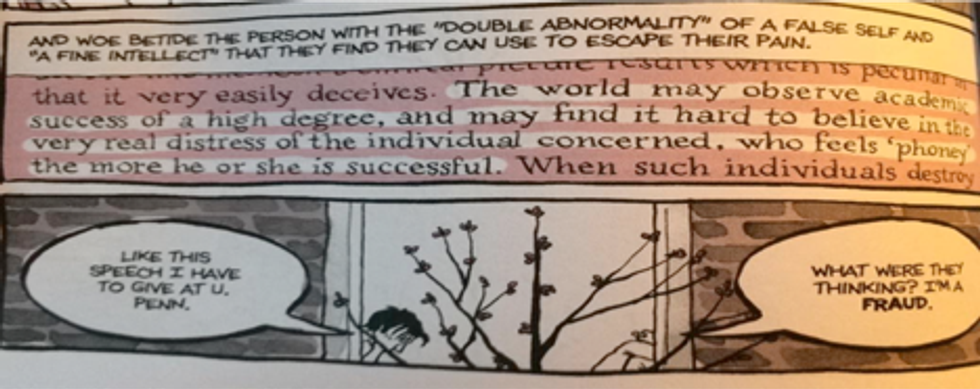I’ve had a really strong (obsessive) phase of reading everything Alison Bechdel has ever written. I’m one of those people that find something remotely relatable and make it a testament to my overall being. So, I was reading her most recent graphic memoir for the third time, "Are You My Mother? A Comic Drama", and came across this particular strip:
Recommended for you
(Alison Bechdel: Are You My Mother? A Comic Drama: 2012)
Instead of reading past it, per usual, it struck me harder than ever before. I, too, have this overwhelming sense of inadequacy, even with constant recognition and tangible proof of my ability to achieve personal or academic or overall success. I, too, think that I am playing this game with society where I have them so convinced I am successful and intelligent that I will be someday “found out.” But, why? Why am I, like Alison, feeling like this insufferable fraud?
Later in the same week, I convinced myself out of a research grant opportunity because I didn’t think I could prove my intellect to society nor did I think I deserved the chance for it. Then, I remembered that strip. My recent epiphany was screaming at me again. So, what’s the deal? How can I escape this vicious cycle of knowing your worth but also not feeling adequate enough to do anything about it?
It’s called “Impostor Syndrome” and its real. Sweeping across the nation, typically in highly successful and gifted women, is this impeccable force of feeling like a phony.
The term was coined by psychologist Clance and Imes in 1978. It’s usually defined as “a collection of feelings of inadequacy that persist even in face of information that indicates that the opposite is true.” So, really, it’s the feeling that you’re not anything you think you are. Ever caught yourself thinking that your accomplishments were associated with luck rather than your capabilities? Or, that your favorite professor will someday “find out” that you actually aren’t smart? There is a trend here.
The three most common categories of “Impostor Syndrome” are “feeling like a fake,” “attributing success to luck,” and “discounting success.” There is a distinct difference between suffering from low self-esteem and having Impostor Syndrome. With Impostor Syndrome, you do not have a recognition of your achievements and the personal feelings you should have to those achievements. It’s masked by your own mind.
Impostor Syndrome may have been cultivated by the beliefs, attitudes, or indirect messages that we have received throughout our childhood. Particularly, by our parents or other significant people in our lives. Such as, family expectations of gender, race, religion, or age; it is also found in families that are very critical or who are increasingly riddled with conflict and anger. Researchers have pinpointed two main types of familial circumstances that can contribute to these feelings: family labels and family messages of superiority.
The “family label” is when a child has a predetermined expectation. The parents might label their two children as the “problem child” and then the other as the “intelligent child.” While growing up, the family may never alter this perspective of the “problem child,” even if they grow up just as intelligent. They are forever stigmatized as the “problem child.” This phenomenon contributes to doubting their positive attributes and believing the family is correct, even in the face of evidence that this label is false.
The “family messages of superiority,” refers to if a child was always supported and the child believes that they are “perfect” (aka: me). As time goes on, and as they encounter difficulties, they might doubt their parents perspective of them. Yet, they will hide their difficulties to maintain the image for their parents. The child will attribute these actually normal challenges as an indicator that they are only average.
When studying “Impostor Syndrome” in gifted and highly successful women, some specific behaviors and beliefs popped up.
Diligence was among many. Gifted women would work extraordinarily hard to prevent people from discovering she was an “impostor.” Typically, the harder you work, the more praise and success you will be rewarded, which only then feeds the impostor feelings and fear of being “found out.” The feeling of being a phony was another. The use of charm in everyday speech came up. There was this conflicting feeling that if she was this gifted, she wouldn’t need any approval from others.This cycle repeats its self-defeating nature.
Impostor Syndrome plagues women across the board because society tells us that a successful woman, an intelligent woman, a confident woman (you get the point) are some threat to society. Research shows that women have some internal motive to “avoid success” because of the fear they would be “less feminine” if they succeed. It’s about the societal stigma that is burying brilliant women into the ground because god forbid a woman be okay with her success.
So, how do we combat with Impostor Syndrome? Be conscious of your personal signs of your particular rendition of Impostor Syndrome. Notice when your thought process reverts to feeling like a phony, or that you are going to be found out. Recognize that you own your successes and that you did not ever get lucky by chance. Take responsibility for both your failures and your successes. You are doing something right, and you deserve to be recognized for it.
Realize that even if you don’t have all the answers all the time it doesn’t invalidate your capabilities. You’re a well of knowledge, treat yourself as always willing to be filled up. Grasp at every opportunity thrown at you. Do not question yourself, question society. Do not let others define you for you are your own definition. Take every compliment,and praise even if it makes you feel uncomfortable. You are something to be uncovered, so lift up your sheets and find it.



















